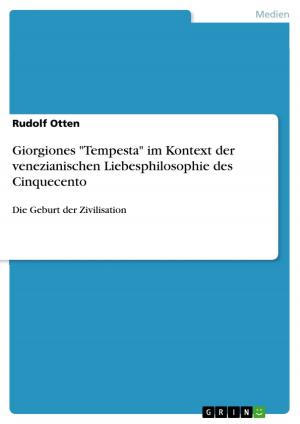The french influence on the english vocabulary in middle english
Nonfiction, Entertainment, Drama, Anthologies| Author: | Claudia Stehr | ISBN: | 9783638783569 |
| Publisher: | GRIN Verlag | Publication: | May 13, 2007 |
| Imprint: | GRIN Verlag | Language: | English |
| Author: | Claudia Stehr |
| ISBN: | 9783638783569 |
| Publisher: | GRIN Verlag |
| Publication: | May 13, 2007 |
| Imprint: | GRIN Verlag |
| Language: | English |
Seminar paper from the year 2000 in the subject English Language and Literature Studies - Linguistics, grade: 1,3, Technical University of Braunschweig (Englisches Seminar), course: Historical Linguistics, 7 entries in the bibliography, language: English, abstract: The French influence on the English vocabulary had its greatest expansion in the period of the Middle English (1150 - 1500). During this time over 10,000 French words were adapted into the English language and about 75 per cent of these are still in use. The reasons for that are, firstly, the bilingualism in England which had been prevailing since the Norman Conquest in 1066. Secondly, the English culture was regarded as inferior, i.e. it had more to gain from the language spoken by the upper classes. Although, these extensive changes were important for the improvement of the English language, there were also disadvantages to it. The loss of native words, the different Middle English dialects, the need of a Standard English are only some examples for this. Does that mean the English we speak today would not have been the same, if there had been no French influence? Undoubtedly, every influence on something does change the circumstances of it, otherwise it would not be an influence. The question now would be, if English really profited from the French language or if it was more a drawback to its further development. I want to deal with this matter of fact in my research paper. I will show the historical conditions from the Norman Conquest up to the 15th century in a diachronical way, as it is important to know about the situation in England at that time to understand the changes in the English language. As the French influence hardly affected the English grammar, I only consider the changes in the vocabulary. I also briefly refer to other language borrowings to show that the French influence was not the only one, but the most effective in the period of great change - the Middle English.
Seminar paper from the year 2000 in the subject English Language and Literature Studies - Linguistics, grade: 1,3, Technical University of Braunschweig (Englisches Seminar), course: Historical Linguistics, 7 entries in the bibliography, language: English, abstract: The French influence on the English vocabulary had its greatest expansion in the period of the Middle English (1150 - 1500). During this time over 10,000 French words were adapted into the English language and about 75 per cent of these are still in use. The reasons for that are, firstly, the bilingualism in England which had been prevailing since the Norman Conquest in 1066. Secondly, the English culture was regarded as inferior, i.e. it had more to gain from the language spoken by the upper classes. Although, these extensive changes were important for the improvement of the English language, there were also disadvantages to it. The loss of native words, the different Middle English dialects, the need of a Standard English are only some examples for this. Does that mean the English we speak today would not have been the same, if there had been no French influence? Undoubtedly, every influence on something does change the circumstances of it, otherwise it would not be an influence. The question now would be, if English really profited from the French language or if it was more a drawback to its further development. I want to deal with this matter of fact in my research paper. I will show the historical conditions from the Norman Conquest up to the 15th century in a diachronical way, as it is important to know about the situation in England at that time to understand the changes in the English language. As the French influence hardly affected the English grammar, I only consider the changes in the vocabulary. I also briefly refer to other language borrowings to show that the French influence was not the only one, but the most effective in the period of great change - the Middle English.















